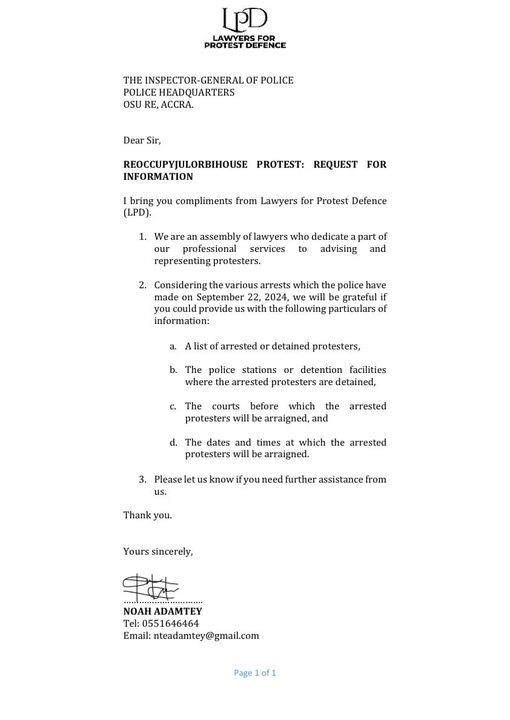The echoes of Sunday’s Democracy Hub protest continue to reverberate through the city’s streets and corridors of power. As the dust settles on what was intended to be a peaceful demonstration against economic hardship, 42 citizens find themselves behind bars, and a group of determined lawyers are demanding answers from the highest echelons of law enforcement.
On Sunday, September 22, 2024, what began as a public outcry against perceived misgovernance and economic woes quickly escalated into a tense standoff between protesters and police. The Ghana Police Service, in a swift and controversial move, detained 42 individuals, including key organizers of the Democracy Hub movement.
It all happened so fast,” recounts Kwame Mensah, a 28-year-old protester who narrowly avoided arrest. One minute we were chanting for change, the next, our friends were being hauled away in police vans. It was chaos.”
In response to the mass arrests, a coalition of legal professionals known as Lawyers for Protest Defence has sprung into action. On Monday morning, the group dispatched a formal letter to the Inspector General of Police, demanding crucial information about the detainees.
Noah Admatey, spokesperson for the legal team, explained their motivation: “We believe in the fundamental right to peaceful protest. Our goal is to ensure that these 42 citizens receive fair treatment and due process under the law.”
The letter, a copy of which was obtained by this reporter, requests specific details including:
1. A comprehensive list of arrested or detained protesters
2. The locations of police stations or detention facilities holding the protesters
3. Information on which courts will hear the cases
4. Dates and times for any upcoming arraignments
The Ghana Police Service, however, maintains that their actions were justified. In a statement released late Sunday night, ACP Grace Ansah-Akrofi, Director of Public Affairs, painted a picture of unruly demonstrators engaging in disruptive and dangerous behavior.
“These individuals were not merely expressing their views,” Ansah-Akrofi asserted. They obstructed traffic, damaged police property, and even attacked officers in the line of duty. Such actions cannot be tolerated in a lawful society.”
The police statement further indicated that all 42 arrested individuals, including protest leaders, would face charges and be brought before the court in due course.
Adding another layer of intrigue to the unfolding drama is the ongoing search for Oliver Barker-Vormawor, identified by police as a key organizer of the Democracy Hub protest. According to a separate police statement, Barker-Vormawor is currently evading arrest, having apparently slipped away in the chaos of Sunday’s events.
“We are actively seeking Mr. Barker-Vormawor’s whereabouts,” a senior police official stated on condition of anonymity. His actions in organizing an unlawful assembly have serious implications, and we urge him to turn himself in peacefully.”
As news of the arrests spread through Accra, reactions among the populace have been mixed. Some, like market vendor Akosua Boateng, express support for the protesters’ cause:
“Times are hard, and people are struggling. These young ones were just trying to make their voices heard. Is that now a crime in Ghana?”
Others, however, emphasize the need for law and order. James Adu, a local business owner, shared his perspective: “I understand their frustrations, but blocking roads and damaging property isn’t the answer. There must be better ways to address these issues.”
As Ghana grapples with the aftermath of Sunday’s events, the incident has ignited a broader debate about the balance between citizens’ right to protest and the maintenance of public order.
Dr. Ama Boadu, a political science professor at the University of Ghana, offered her analysis: “This situation highlights the ongoing tensions in our young democracy. How we resolve this conflict between expression and order will be crucial for Ghana’s political future.”
As night falls on Accra, the fate of the 42 detained protesters remains uncertain. The actions of the Lawyers for Protest Defence group have thrust the issue into the national spotlight, raising important questions about transparency, accountability, and the right to peaceful assembly in Ghana.
The coming days will be crucial in determining how this situation unfolds. Will the police provide the requested information? What charges, if any, will the protesters face? And perhaps most intriguingly, will Oliver Barker-Vormawor emerge from hiding to face the authorities?
One thing is clear, the Democracy Hub protest and its aftermath have touched a nerve in Ghanaian society, sparking a national conversation about governance, economic hardship, and the limits of public dissent. As the legal process moves forward and tensions simmer, all eyes remain fixed on Accra, waiting to see how this pivotal moment in Ghana’s democratic journey will resolve.
For now, the streets of the capital may have quieted, but the echoes of Sunday’s protest continue to resonate, challenging Ghana to navigate the delicate balance between order and freedom in an evolving democracy.



